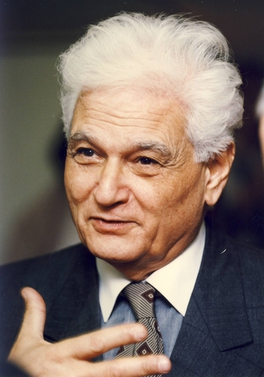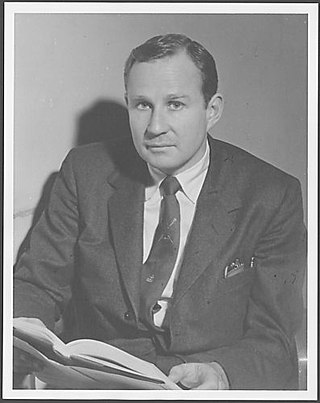Postmodern philosophy is a philosophical movement that arose in the second half of the 20th century as a critical response to assumptions allegedly present in modernist philosophical ideas regarding culture, identity, history, or language that were developed during the 18th-century Age of Enlightenment. Postmodernist thinkers developed concepts like difference, repetition, trace, and hyperreality to subvert "grand narratives", univocity of being, and epistemic certainty. Postmodern philosophy questions the importance of power relationships, personalization, and discourse in the "construction" of truth and world views. Many postmodernists appear to deny that an objective reality exists, and appear to deny that there are objective moral values.

Jacques Derrida was an Algerian-born French philosopher. He developed the philosophy of deconstruction, which he utilized in a number of his texts, and which was developed through close readings of the linguistics of Ferdinand de Saussure and Husserlian and Heideggerian phenomenology. He is one of the major figures associated with post-structuralism and postmodern philosophy although he distanced himself from post-structuralism and disowned the word "postmodernity".

Pragmatism is a philosophical tradition that views language and thought as tools for prediction, problem solving, and action, rather than describing, representing, or mirroring reality. Pragmatists contend that most philosophical topics—such as the nature of knowledge, language, concepts, meaning, belief, and science—are all best viewed in terms of their practical uses and successes.

Richard McKay Rorty was an American philosopher. Educated at the University of Chicago and Yale University, he had strong interests and training in both the history of philosophy and in contemporary analytic philosophy. Rorty's academic career included appointments as the Stuart Professor of Philosophy at Princeton University, Kenan Professor of Humanities at the University of Virginia, and Professor of Comparative literature at Stanford University. Among his most influential books are Philosophy and the Mirror of Nature (1979), Consequences of Pragmatism (1982), and Contingency, Irony, and Solidarity (1989).

John Henry McDowell is a South African philosopher, formerly a fellow of University College, Oxford, and now university professor at the University of Pittsburgh. Although he has written on metaphysics, epistemology, ancient philosophy, nature, and meta-ethics, McDowell's most influential work has been in the philosophy of mind and philosophy of language. McDowell was one of three recipients of the 2010 Andrew W. Mellon Foundation's Distinguished Achievement Award, and is a Fellow of both the American Academy of Arts & Sciences and the British Academy.

Wilfrid Stalker Sellars was an American philosopher and prominent developer of critical realism, who "revolutionized both the content and the method of philosophy in the United States".
Explication is the process of drawing out the meaning of something which is not clearly defined, so as to make explicit what is currently left implicit. The term explication is used in both analytic philosophy and literary criticism. Rudolf Carnap was the first to coin the term in an analytic philosophical approach in his book Logical Foundations of Probability, while the term is supplanted with Gustave Lanson’s idea of Explication de Texte when referring to the analysis and criticism of different forms of literature.
Ordinary language philosophy (OLP) is a philosophical methodology that sees traditional philosophical problems as rooted in misunderstandings philosophers develop by distorting or forgetting how words are ordinarily used to convey meaning in non-philosophical contexts. "Such 'philosophical' uses of language, on this view, create the very philosophical problems they are employed to solve."

Logical atomism is a philosophical view that originated in the early 20th century with the development of analytic philosophy. It holds that the world consists of ultimate logical "facts" that cannot be broken down any further, each of which can be understood independently of other facts.
Modern philosophy is philosophy developed in the modern era and associated with modernity. It is not a specific doctrine or school, although there are certain assumptions common to much of it, which helps to distinguish it from earlier philosophy.
Contemporary philosophy is the present period in the history of Western philosophy beginning at the early 20th century with the increasing professionalization of the discipline and the rise of analytic and continental philosophy.

Robert Boyce Brandom is an American philosopher who teaches at the University of Pittsburgh. He works primarily in philosophy of language, philosophy of mind and philosophical logic, and his academic output manifests both systematic and historical interests in these topics. His work has presented "arguably the first fully systematic and technically rigorous attempt to explain the meaning of linguistic items in terms of their socially norm-governed use, thereby also giving a non-representationalist account of the intentionality of thought and the rationality of action as well."

The linguistic turn was a major development in Western philosophy during the early 20th century, the most important characteristic of which is the focusing of philosophy primarily on the relations between language, language users, and the world.
Neopragmatism, sometimes called post-Deweyan pragmatism, linguistic pragmatism, or analytic pragmatism, is the philosophical tradition that infers that the meaning of words is a result of how they are used, rather than the objects they represent.

Philosophy and the Mirror of Nature is a 1979 book by the American philosopher Richard Rorty, in which the author attempts to dissolve modern philosophical problems instead of solving them. Rorty does this by presenting them as pseudo-problems that only exist in the language-game of epistemological projects culminating in analytic philosophy. In a pragmatist gesture, Rorty suggests that philosophy must get past these pseudo-problems if it is to be productive. The work was considered controversial upon publication, and had its greatest success outside analytic philosophy.
Postanalytic philosophy describes a detachment from the mainstream philosophical movement of analytic philosophy, which is the predominant school of thought in English-speaking countries. The Internet Encyclopedia of Philosophy defines the movement as denoting "philosophers who owe much to Analytic philosophy but who think that they have made some significant departure from it." The movement cannot be unified into a single positive project as it is defined it terms of what it stands against, although it has generally been seen as bridging the gap between analytic and continental philosophy.
Richard Shusterman is an American pragmatist philosopher. Known for his contributions to philosophical aesthetics and the emerging field of somaesthetics, currently he is the Dorothy F. Schmidt Eminent Scholar in the Humanities and Professor of Philosophy at Florida Atlantic University.

James Opie Urmson was a philosopher and classicist who spent most of his professional career at Corpus Christi College, Oxford. He was a prolific author and expert on a number of topics including British analytic/linguistic philosophy, George Berkeley, ethics, and Greek philosophy.

Richard Jacob Bernstein was an American philosopher who taught for many years at Haverford College and then at The New School for Social Research, where he was Vera List Professor of Philosophy. Bernstein wrote extensively about a broad array of issues and philosophical traditions including American pragmatism, neopragmatism, critical theory, deconstruction, social philosophy, political philosophy, and hermeneutics.
This is an index of Wikipedia articles in philosophy of language









